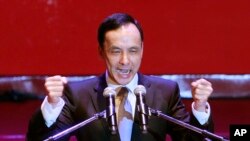Taiwan’s ruling Nationalist Party picked a new presidential candidate Saturday in an effort to improve its standing in the polls. The party that advocates strong ties with Taiwan’s old rival China is lagging just three months before the election. Its new nominee is given a strong chance of narrowing that gap. Ralph Jennings has the story from Taipei.
The Nationalist Party, which has ruled Taiwan for nearly eight years, removed veteran legislator Hung Hsiu-chu as its nominee for president. She was trailing the opposition candidate by about 20 percent in opinion polls. At a special party congress, the party picked instead Eric Chu, who is party chairman and mayor of the island’s biggest city.
Any victory for the Nationalist Party or KMT would sustain today’s conciliatory relations with China, which claims sovereignty over self-ruled Taiwan and has threatened to take it by force if necessary. The Nationalist government kicked off dialogue with Beijing in 2008 and has eased tensions. Alexander Huang (黄介正), a strategic studies professor at Tamkang University in Taiwan, says China is privately hoping the Nationalists remain strong.
“Most of the political analysts for their own government in China are in a pretty uncertain and insecure mode," said Huang. The general sense is that Beijing would like to see that the KMT maintain its political influence with a comfortable footprint in Taiwan's every constituency.”
Chu will face off in the January 16 election against the opposition Democratic Progressive Party's chairwoman Tsai Ing-wen. Tsai has run a clean, high-profile campaign since April, three months before the Nationalists picked their original nominee. No party in Taiwan has changed presidential candidates in mid-stream before.
Tsai's camp advocates a rethinking of today's basis for dialogue with China, effectively requiring that Beijing see Taiwan as a separate country. China and the Nationalists now regard each other as two parts of the same country. China is unlikely to support the opposition's idea, meaning relations would stall until the two sides learn to work together. Taiwan and China have been separately ruled since the 1940s.
The Nationalists lost popular support last year after tens of thousands protested the pace and transparency of agreements that the government has made with China since 2008. The 23 deals reached to date cover mostly investment, tourism and trade with the giant Chinese economy. The same party lost nine mayoral and county magistrate seats in November as the opposition camp picked up seven.
Hung Hsiu-chu, a veteran legislator and former teacher, turned off voters because of her pro-China stance and lack of experience in government administration. Hung has said she was disappointed but respectful of the party's move. Chu apologized to her earlier in the week.
Analysts do not expect the new KMT nominee to win but say his campaign may be strong enough to hold the party's slim majority in parliament. Parliament has the authority to scrap or change bills proposed by government, including measures related to China.




